#the fact that i unconsciously use dabi and touya to refer to two different people is somewhat insane
Explore tagged Tumblr posts
Note
eveyone calling dabi touya after the reveal is making me wanna claw my eyes out because HOW IS EVERYONE MISSING THE POINT SO FUCKING BADLY
THE POINT IS THAT HE ISN’T TOUYA AND HE NEVER WILL BE AGAIN BECAUSE TOUYA IS DEAD
dabi was created from the ashes of touya and that’s literally the whole point
he can never BE touya again because of the things he’s done and the small issue that touya is legally dead
AND WHAT MAKES YOU THINK HE WANTS TO BE TOUYA AGAIN??????
he wants NOTHING to do with the todoroki’s and tries to actively distance himself from his family
ik he is so fucking pissed in the afterlife because everyone is calling him touya when he’s not touya he’s DABI
same with shigaraki. this one is definitely an unpopular opinion but people calling him tenko just feels so wrong to me
i just hate it when people think that just bc it’s technically their real names is means is *their name*
like sure my legal name is my legal name but *my name* is caleb
anyway i just wanna scream sometimes
You bring a very interesting point!!
This is something I haven't really realised, but now that you mentioned it and now that I am looking back at various different posts, I can tell how different people sometimes use dabi and touya interchangeably and yeah actually it makes sense why you're mad about it.
A core part of Dabi's character is that he is no longer Touya. Touya died the minute he went back to his old home, and everyone forgot about him, and nothing changed. The greif and emotions that young touya held to try and appease to his father burned away turning touya into ashes and that's how dabi was born.
Yes, the phoenix imagery with Dabi is strong. The death of touya, where touya turns into ashes and dabi is born from those ashes, is something so slept on by the fandom!!


People using dabi and touya interchangeably is like someone using jink and powder interchangeably. The plot for both mha and arcane has made it clear that those characters are two different people.
Jinx isn't powder, and powder isn't jinx. They might be the same person genetically speaking, but they aren't the same when it comes to character and personality.


The same thing goes for dabi and shigaraki. However, the plot of Mha does make it an integral part of Dabi's character it literally focuses and says it directly on chapter 350!!
Dabi, like you said, will never be touya, and touya will never be dabi. I have noticed that even when it comes to me writing my analysis, I have never really used dabi and touya interchangeably. When it comes to me talking about touya, I talk about touya, and when I talk about dabi, I talk about dabi (this doesn't make sense, but I have no way of fully explaining it tbh)
Shigaraki is a bit more complicated and a bit of a grey area. Yes, he also has the same thing as both dabi and jink, yet it's not made or focused to be an integral part of his character. I personally blame the writing for that instead.
With shigarakis character, it's kind of the opposite of jink and dabi. What I mean is that the narrative kind of goes out of its way to make it clear that shigaraki will always be tenko even if he tries to reject that. This can be seen with izuku seeing tenko or during shigaraki's fight with afo and mirio he mentions HIS backstory with HIS friends.
As much as shigaraki may try to reject it, he is tenko, and in the end, he acknowledges that. He dies as both tenko and as the leader of the leauge of villains.


#mha#bnha#mha critical#bnha critical#thanks for the ask#thanks for the ask!#bhna critical#dabi#shigaraki#the fact that i unconsciously use dabi and touya to refer to two different people is somewhat insane#its the same with how jink and powder are two different people#well not really but jink isnt powder and powder isnt jink#just like how dabi isnt touya and touya isnt dabi#metaphorical death of a character
49 notes
·
View notes
Text
There Are No True Heroes
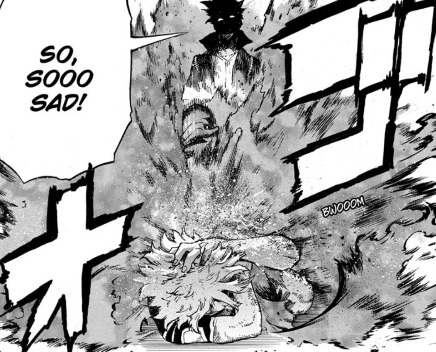
Dabi is shown wrapped in shadow as he confronts Hawks this chapter. That is because as his foil, as both of them were abused by the hero system as basically raised as child soldiers under the name of “hero training” they are two sides of the same coin. No one is closer to Hawks than Dabi, because Dabi is his own shadow. Dabi however is not just serving as a shadow for Hawks in a Jungian sense, but as a collective shadow for hero society as a whole. Read More underneath the cut explaining Dabi’s words for how there can be no true heroes in a society that doesn’t save people like Twice or Touya Todoroki.
1. A Society of Repression
Before getting the ball rolling I’m going to introduce some terms important to Jungian Psychology.
Jung saw the conscious mind divided in two. This is often referred to as the “iceberg model” because for the same reason that the titanic failed to dodge the ice berg, most people don’t have a true comprehension of personality because there’s much more going on than just what can be perceived in the surface.
The surface of personality is called the ego or the conscious mind. This is all of the thoughts you are aware of, all of the decisions you make, like your behavior, how you act, what you say, what you think, all of these things are conscious aspects of personality. They’re referred to as consicous because we can see, look at, control them to some extent. For example people tend to behave differently depending on their environment, you don’t usually swear in front of your grandparents but you might around your friends. The fact that you are choosing how you present yourself means part of personality will always be a performance.
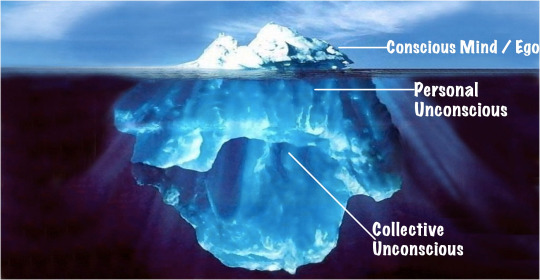
The unconscious mind is specifically what you are not aware of. It’s everything else that makes up personality. Jung believed the unconscious mind existed in a form called the shadow. The shadow is cast by what the light of consciousness projects, and consists of everything that consciousness excludes. It is the unknown side. If the consciousness is the face, the shadow is the reverse face.
It’s the difference of who you choose to be and who you are at heart.
“We can speak of the conscious ego as the subjective personality, and of the shadow self as the objective personality.”
Because one tends to reject or remain ignorant of the least desirable aspects of one's personality, the shadow is largely negative. There are, however, positive aspects that may also remain hidden in one's shadow (especially in people with low self-esteem, anxieties, and false beliefs).
The mechanism that people use to remain unaware of these aspects of their personality is called repression.
Repression. Repression. The unconscious suppression of psychic contents that are incompatible with the attitude of consciousness. Repression is a process that begins in early childhood under the moral influence of the environment and continues through life. [“The Personal and the Collective Unconscious,” CW 7,]
In general, people have a tendency to avoid rather than confront issues, especially if those issues are personal ones. Repression is a technique of avoidance to try to keep the mind healthy in spite of internal or external stress. Psychologically speaking it’s avoiding the problem. While of course it’s impossible to live life confronting every single problem possible, there’s still a difference between acknowledging a problem and admitting that it’s a problem and dealing with it by simply pretending that it is not there. Repression renders problems invisble by turning a blind eye to them, which is why this meta will be speaking of societal repression on a whole later one.
Jung suggests the idea that repression, having a shadow, being two-faced is not something that certain individuals do but rather something everybody is doing at the same time. In a society of people who all have this unconscious aspect of their mind Jung suggests the collective unconscious exists.
That the shared human experience of everybody existing within a society will create a collective suboncious amongst these people. The collective unconscious is unconscious ideas of society or life that just seem to be there. The myth of the hero itself is a product of collective unconscious, Jung posits every culture comes up with myths of heroes because that idea exists in some deep layer of our minds and it’s something we all have in common beyond the bounds of personal consciousness.
So just to summarize quickly you have three layers, personal conscious who you choose to be, the shadow who you are, and the collective unconscious what society is.
In Jung’s terms absolutely everything has a shadow.
"The image of God has a shadow. The supreme meaning is real and casts a shadow. For what can be actual and corporeal and have no shadow?"
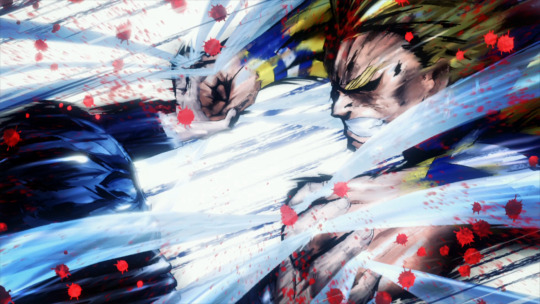
All Might and All For One are literally a symbolic hero and shadow pairing. All Might is someone who attempts to influence society by being the best hero he can be, All For One tries to control society too through violent methods. All Might is conscious of how he wants to create a peaceful, controlled society but unconscious of the violence inherent in his actions.
The shadow is something that everyone collectively ignores as well. Someone even points out that All Might’s actions are still violence whether it’s heroic or not and All Might doesn’t even address the argument he just blows it off. In a repressed society the issues that everyone wants to avoid aren’t dealt with they’re insvisible.
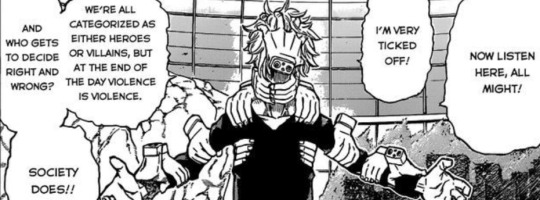
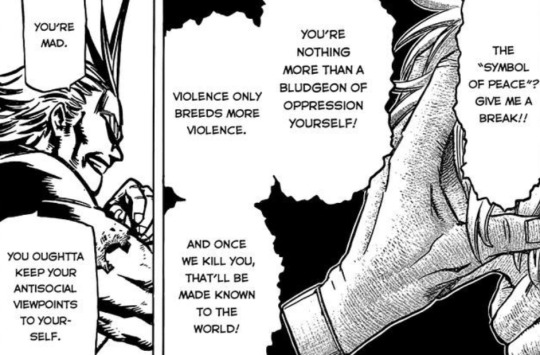
So not only is there an individual repression, but there are also aspects of societal repression. If everything casts a shadow then society itself can cast a shadow. The issues that everyone is avoiding, the issues that everyone is ignorant to will manifest in some way.
"Unfortunately there can be no doubt that man is, on the whole, less good than he imagines himself or wants to be. Everyone carries a shadow, and the less it is embodied in the individual's conscious life, the blacker and denser it is. If an inferiority is conscious, one always has a chance to correct it. Furthermore, it is constantly in contact with other interests, so that it is continually subjected to modifications. But if it is repressed and isolated from consciousness, it never gets corrected."
This is an idea that has been expressed in comics several times before. One of the most famous ones is Rorsharch’s monologue from Watchmen.
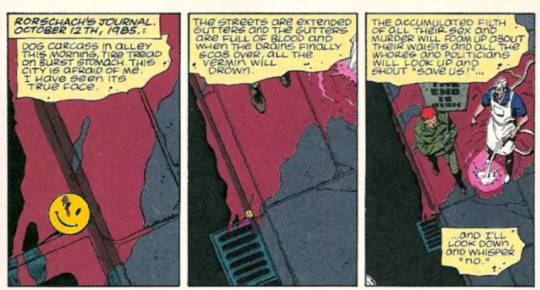
Rorsarch’s monologue is expressing a strictly Jungian idea. If no one attempts to deal with the problems that are inherent in modern day society and effect everybody, then those problematic elements will eventually float to the surface no matter how much they’re ignored. If one person litters it’s not a big deal, but if one hundred people litter then there’s going to be trash everywhere. If people keep ignoring the trash everywhere and make no attempt to deal with it, the problem is just going to stick around until it’s impossible to ignore.
This is what we are witnessing happening in My Hero Academia as of this arc. The accumulated filth of all their sex and murder will form up about their waists and all the whores and politicians will look up and shout, save us!
The League of Villains are not just characters. They are the manifestations of what has been repressed about society. They are the filth that has accumulated floating to the surface. This is an inevitability with repression. Everything that is repressed will show eventually.
2. There Are No Real Heroes
Dabi’s statement “There are No Real Heroes” isn’t just him being an edgelord. It’s a genuine response to the trauma he’s suffered. There’s on example from another piece of media I think illustrates this perfectly.
Dangan Ronpa: Another Episode is a story where children who were abused begin a rebellion first by killing the adults who abused them, and then against the society that ignored their abuse, but they begin taking it too far and slaughter adults who were not involved.
There is one moment in the game where the main character, a normal girl who has never been abused by an adult confronts one of the children about this. The best argument she can come up with is “Not all adults...”
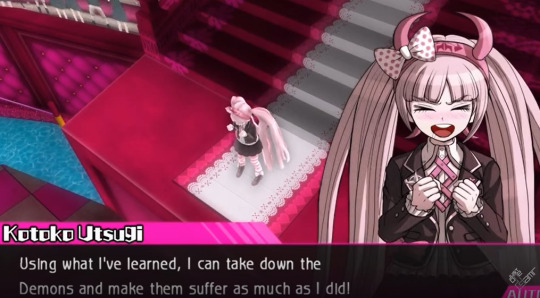
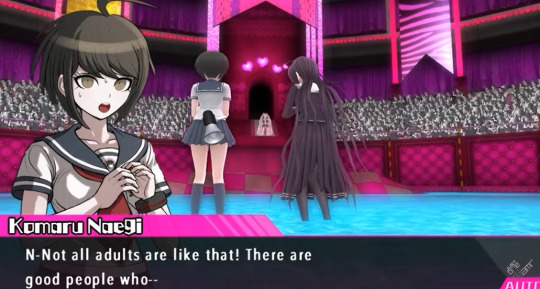
The child’s response is to scream: “Then why didn’t anyone save me?”
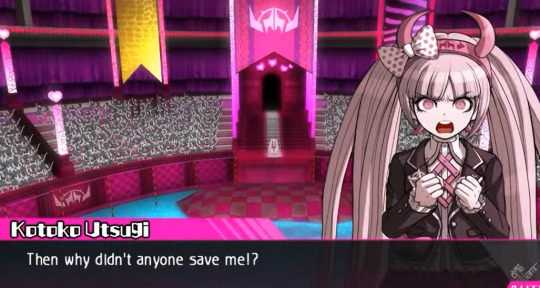

If the world is good. If people are just. If heroes exist. Then why did this little girl not get saved? Why was she abused by the people around her? Why did no one else come to help?
Remember Jung, people are on a whole not as good as we imagine them to be. The heroes in My Hero Academia are the same. We are told that they save people. We are told that they are good and right. Yet we witness countless examples of heroes not saving people. We see heroes being used as tools of violent suppression, rather than saving people.
There are no real heroes. In Stain’s words, heroes are phonies. That’s because heroes are not as good as we are told they are. Society is not as good as we are told.
What’s important is that a child is screaming this. What good is a society that can’t save one little girl? How do you expect a child to understand the reasons why they weren’t saved? For Dabi, for Stain, heroes are people who we are told are good but don’t act good. This is especially prevalent for Dabi who was hurt personally and had his entire family destroyed by one of the bad heroes. How is Dabi supposed to believe that heroes are good, when not only does Endeavor who doesn’t care about saving other people only defeating strong enemies is constantly praised as a good hero, but also completely got away with what he did to his family.
There is Endeavor the hero.

There is Endeavor’s shadow.

How can one of his victims. Someone who was most likely killed by him really believe that heroes exist when he was killed by a hero? How can he believe society is good when his father is praised by society. This is what repression does it makes people ignorant, and therefore complicit. Endeavor is not just the problem he’s propped up by society as a whole. Even people who are good, well-intentioned people end up supporting Endeavor completely ignorant to what he’s done.
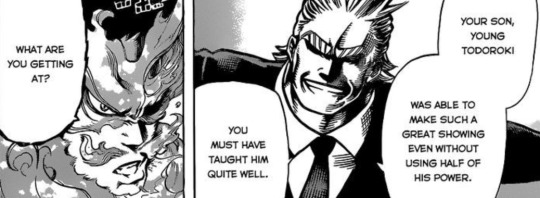
All might literally not only openly supports a child abuser like Endeavor, but praises him as a good hero, and even reccomends other children like Bakugo and Deku study under him. How much of this is genuine igonrance, and how much is intenitonal negligence? Todoroki walks around with a scar on his face and a clear chip on his shoulder about his dad. All Might doesn’t notice because he’s never questioned hero society before.

This is something we are shown over and over about hero society. That it thrives by intentional negligence. Shigaraki’s not being edgy once again he’s talking from experience.
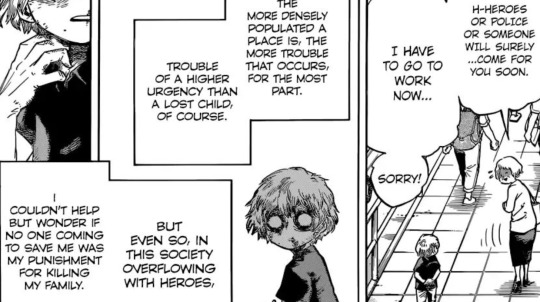
Shigaraki suffers a terrible accident and despite wandering around looking for help at five years old in one of the most densely populated places with several heroes running around not a single person comes to help him. It’s not just ignorance it’s intentional negligence, because Shigaraki’s not a good or virtuous victim, because Heroes don’t save people they beat up villains. They’re a tool for violent suppression.
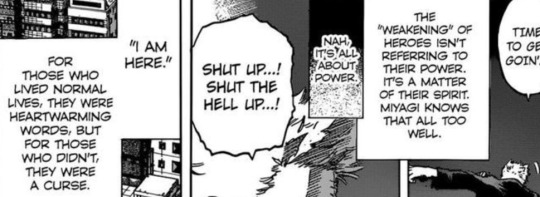
All Might acting as the symbol of peace also acted as a symbol of repression. Because there are groups of people who don’t get saved by All Might. People like Twice who will never get saved. How can they call themselves heroes if the weakest, the worst off, the most damaged are always thrown to the wolves.
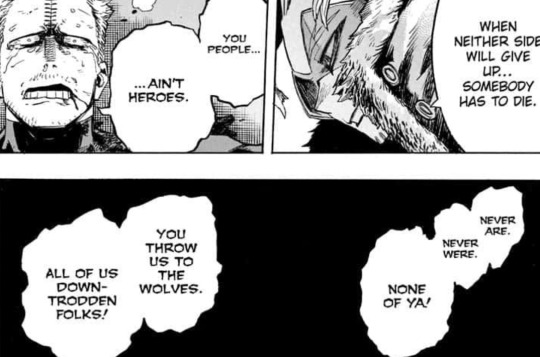
3. A Reckoning
What is repressed cannot stay repressed forever. Dabi is covered in shadow this entire chapter, because he’s acting as a stand-in for the repressed id of society. The shadow that is there and is created by the heroes. He even parallels the way Hawks was a few chapters ago.
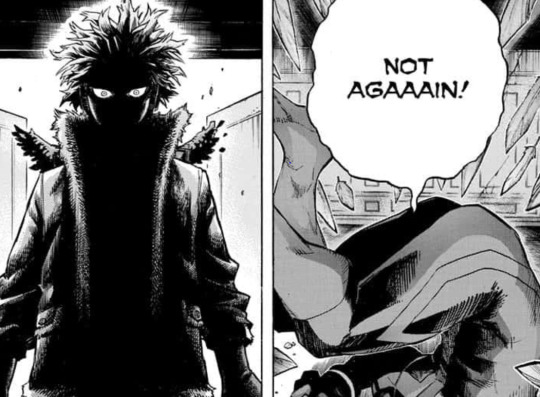
Another unheroic hero. A hero who doesn’t save someone crying and begging for help in front of them and instead decides to stab them in the back because that’s is what is easiest and most convenient.
Hawks. Endeavor. Heroes in general, claim to be heroic, claim to never give up. But then don’t bother to save people like twice, even when they’re crying and begging in front of them. We are being presented with heroes as they exist in the ideal, and then the way heroes actually act. Miruko says a hero never gives up, Hawks gave up on Twice and tried to murder him ridiclously fast.
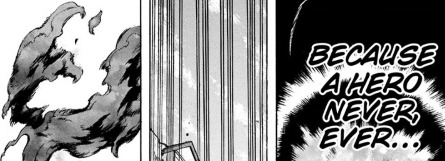


The light casts a shadow, this is a paradox we’ve seen before with Endeavor too. Hawks sees Endeavor as an ideal of someone who never gives up.
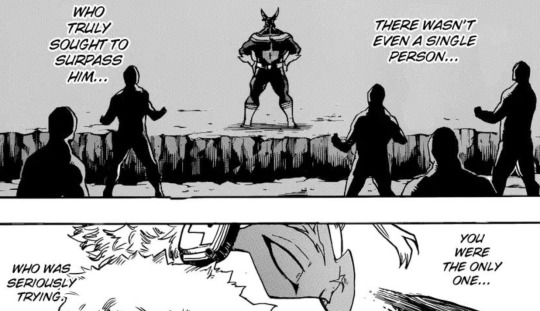
Natsuo rightfully pointed out that Endeavor gave up all too quickly actually. He gave up fighting against All Might and instead abused his wife and children.
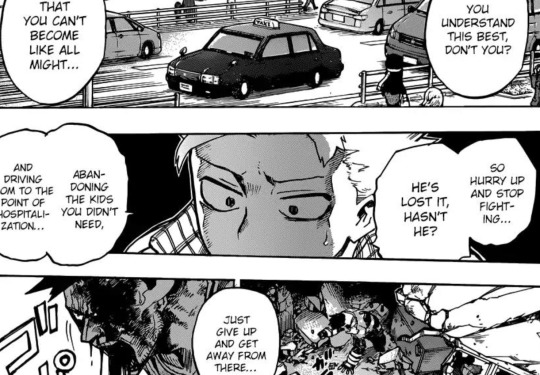
For every single action there is the light and there is the shadow. However, hero society never acknowledges the shadow and chooses to repress its evils instead of confronting them. It’s not that Endeavor abused his family it’s that he got away with it, not a single person held him accountable. Hawks was taken in by the hero commission in the exact same way that Shigaraki was by AFO, and nobody held them accountable for doing that to a child.
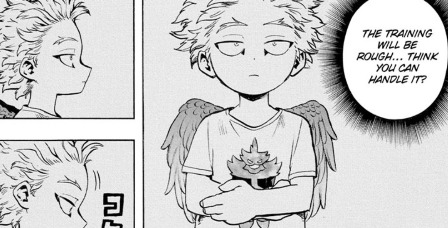
Child abuse is still child abuse even if the “good guys” are doing it. In Jungian ideas if nothing is confronted about society then eventually something will rise up.
"[The figure of the Trickster] is the collective shadow."
A collective shadow. A collective societal Id. Returning to Rorsharch’s quote it’s quite literally the trash that everyone threw away floating back up to the surface and brought to light. This is why people are moved by Stain’s words, because it is in a way a wake up call to confront what is wrong about society.

Stain, Shigaraki, Dabi all three of them are manifesting of literal collective shadows of society. They are there to confront what everyone is told is good and show the darker sides to things.
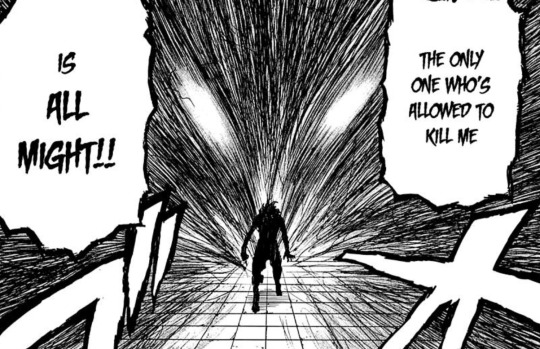
That is essentially what Dabi is talking about. Dabi himself is not just an abused child, he stands in for all of the abused children who get left behind or ignored by society.
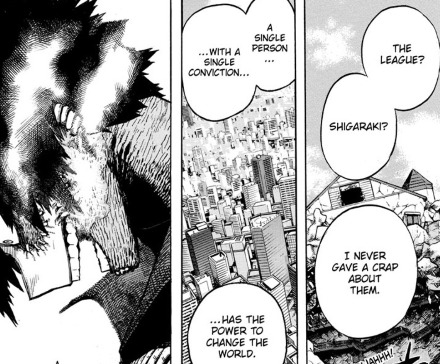
What Dabi is talking about is a reckoning. The confrontation with the shadow of society that will inevitably happen. The garbage floating to the surface. Dabi is embodying that shadow in his actions. Individuals don’t matter. What matters is the collective will of everybody, all of the outcasts banded together, everything which can be no longer ignored.
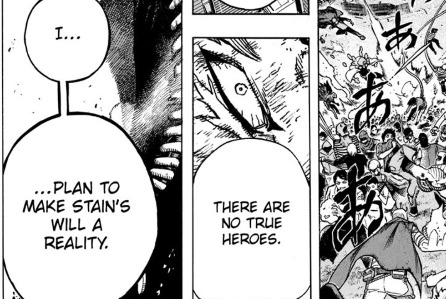
Which is why in a Jungian sense, the league themselves do not matter. Dabi himself does not matter. Not even Hawks matters. What matters is the ideas they represent behind them. It’s why Dabi cannot be killed, because eventually hero society continuing on unchanged will just create another Dabi.
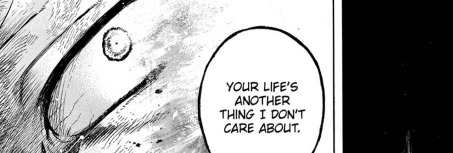
Individuals and individual suffering do not matter in the face of hero society. That’s what Dabi is angrily reminding Hawks of. He may have just saved a bunch of people by killing Twice, but nobody is going to thank him, his deeds are going to go unrewarded, because in the end Hawks too is somebody as equally disposable as Dabi and Twice. What matters is the ideas they represent, and Hawks has murdered someone in the name of resisting change to the status quo while Dabi is trying to fight it. Hawks too is complicit in the same system that abused him as a child, and his actions do nothing to stop that abuse.
A reckoning. A fall. A shadow that is not confronted or acknowledged will never change. If it is repressed it will never get corrected. My Hero Academia posits that not only is hero society falling inevitable, it is also necessary. Dabi himself is a villain, but he’s also acting as the shadow of all of the ills of society in order to force society to confront those ills rather than just continue on ignoring them.
#mha meta#hawks#dabi#league of villains#hero society#takami keigo#todoroki touya#my hero academia meta#my hero academia
882 notes
·
View notes
Text
Killing & Morality
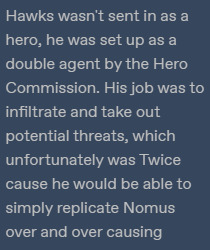
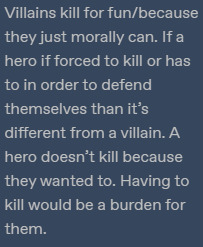
These two replies that I got in response to my post on heroes not being allowed to kill are questionable at best, but mostly just miss the point by a lot.
I disagree with the first sentence of the first reply. While it’s true that the villains overall have a different moral compass than the heroes do, but a person’s morality isn’t based on how they act. Rather, it’s defined as ‘a set of personal or social standards for good or bad behavior and character’ - and we can see in Dabi’s speech in chapter 290 that he is aware that killing people is bad, referring to this as ‘despicable acts’
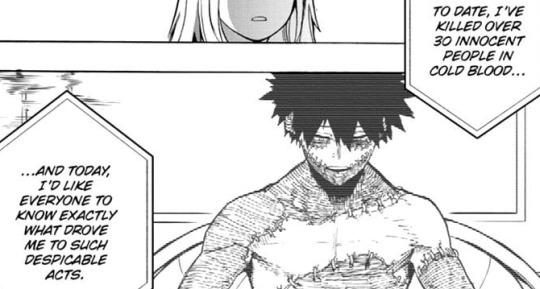
Of course you can judge whether a person is behaving moral or not, but claiming a villain kills people because they ‘morally can’ is simply incorrect because anyone is capable of killing, regardless of their moral compass.
Though I slightly understand where this person is coming from in saying that a hero killing is different than when a villain kills someone, we generally also only see the League of Villains kill people in a ‘kill or be killed’ type situation, rather than them just walking around killing citizens as they please.
‘A hero doesn’t kill because they wanted to’ - is just showing how messed up society in the my hero universe is. Humans don’t kill other humans, not just because we generally don’t want to, but because we overall don’t have a reason to kill for survival reasons. The League of Villains is this sympathetic group to the readers because we are given reasons for their actions. They aren’t people who woke up one day and decided to commit crimes and terrify people; but rather they are people who have been failed by a society that has been idolizing heroes to the point of relying on them so much they don’t consider helping anyone around them, like little Tenko. It’s not that they just kill because they take joy in the act itself or the power one might feel from taking a human life. Being villains is their desperate attempt at surviving and creating a space in a society that has decided they are worthless.
‘Having to kill would be a burden on them’ - though we don’t see the members of the League regretting their crimes, please understand that the difference here is that the heroes live comfortably in society. Again, the League has to fight for their rights to exist, when the so called heroes around them didn’t deem them worht saving. They don’t show killing to be a burden on them because it’s either this or dying themselves.
The second reply is also a weird attempt at justifying someone killing another person? Question mark because, as many people have already nicely pointed out in the replies/reblogs, the story itself isn’t trying to justify Hawks killing Twice, so why are so many people in the fandom trying to defend him?
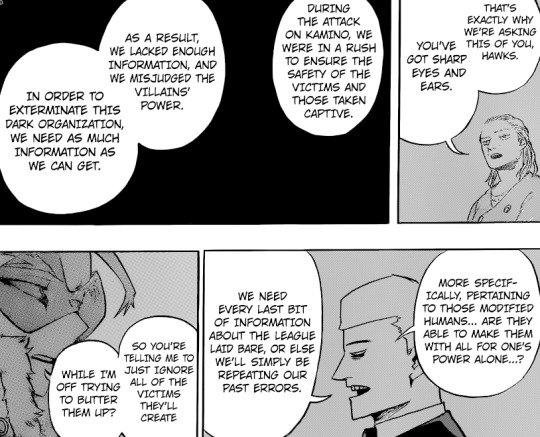
I am not entirely sure where in these panels above (chapter 191) you read ‘Hawks, you have permission to kill people’ but sure, his job was to act as spy and gather as much information on the League as possible in order to give the heroes an advantage to take them down. By being a spy, he was allowed to ignore casualties. But there is still a difference between letting a villain kill people - rather than trying to stop them and save the victims as a hero is normally supposed to - and being allowed to do the killing himself.

In the following chapter the flashback continues and Hawks says he is fine with corrupting himself for the greater good. Going back to morality, this shows us that even though killing and not saving people goes against his moral compass, he is okay with it anyway for the bigger picture, much like Dabi was okay killing people in order to show people the flaws of hero society.
Their end goal was to use the information he would gather to make a successful attack from the inside and outside.
The last part of that reply is something that people constantly like to bring up in order to justify Twice being killed - saying that he was too big of a threat and thus Hawks had to kill him in order to avoid too much damage.
There is still damage, though. I agree that Twice’s quirk is incredibly powerful and dangerous. You can kill the entire League, but as long as Twice is around, they can be brought to live through him over and over again.
That doesn’t change the fact that Hawks went straight for the kill as soon as Twice refused his offer, when he as a trained hero should be capable to just knock him unconscious instead, which was the whole point I was trying to make.
Hawks made Twice an offer that he obviously would turn down and Hawks should have known this. Offering someone a second chance when the last time they were offered one it ended up backfiring would already make him hesitant and if this second chance requires him to sell out his family, the first group to take him in and accept him for who he is, then of course he is not going to accept this second chance. It’s the whole ‘I’d rather be homeless with someone I love than live in a house with someone I hate’ type of attitude.
Hawks never attempted to fight Twice. He immediately cornered him with his sharpened feathers and made him an offer he could only refuse and once that decision was made, Hawks immediately decided to kill him. There was no attempt at fighting him. During this, he put up a fight with Dabi, despite knowing that fire is his biggest weakness, yet he didn’t give Twice that same chance.
You are allowed to like Hawks - he is a fantastic character for this story to represent just how corrupt hero society is and just how much it can brainwash its own heroes and use them as puppets, much like Endeavor has attempted with Touya/Shouto. But the story itself tells us that heroes are not allowed to kill. I’m sure society is going to see a difference in this kill and a villain killing someone. That doesn’t make it right, either. And that’s the point of this story, that’s the point Dabi is trying to make with his speech. He is telling them that this society is corrupt and needs to make changes, because it’s unfair, because heroes get free passes that no one else would.
Hawks will most likely not go to prison for this, because he killed someone with a dangerous quirk during a battle. Still, he could have tried to fight him. Especially as Number Two Hero, he should be capable of taking down a villain without killing them, because that is his entire job.
To sum it all up with this fantastic Dabi quote:
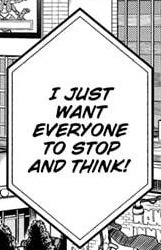
46 notes
·
View notes